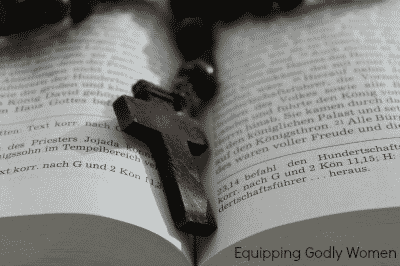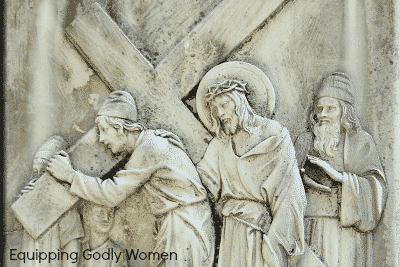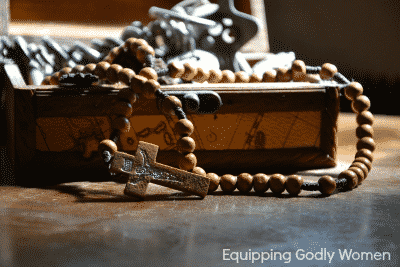What is Purgatory? What are Indulgences?

This post is post 10 in a series entitled Letting God Lead: My Journey Through Protestant and Catholic Beliefs. While you certainly can read this post by itself, I highly encourage you to check out the rest of the series as well. Find more about this series and a list of all of posts here. *This post contains affiliate links.
Growing up Protestant, I had heard of Purgatory, but knew very, very little about it. In fact, when my Catholic husband and I first got married, I made the joke: “Well, great. When we all die, my family (that I grew up in) is going to get to fast-track it straight to Heaven (because they are Protestant), while I’ll be stuck sitting at a table waiting my turn to get in with you!”
What is Purgatory?
According to official Catholic teaching, Purgatory is a state of being wherein those who are definitely going to Heaven are purified on their way there (since nothing “unclean” can enter Heaven). We do not EARN our salvation in Purgatory–we already have it because of Christ’s work on the cross. Purgatory is just a state of sanctification/purification where any remaining attachments we have to sin are broken.
What Does the Church Teach About Purgatory?
God has given us free will. We use this free will every day as we choose to follow or reject God. Once we die, however, we are held accountable for how we choose to live our lives. Did we seek every day to follow Jesus to the best of our ability, even when it was hard? Or did we just call ourselves Christians without actually being one?
After examining our lives, God will judge whether we were true followers of His or not. Those people who did seek a closer relationship with Him will be allowed to have that relationship with Him in Heaven. Those people who chose not to have a relationship with Him will be allowed not to in Hell. God doesn’t force someone to be in Heaven who doesn’t want to be there.
(Up until this point, Protestants and Catholics should pretty much all agree.)
However, AFTER we are granted salvation and we are 100 percent for sure going there, Catholics believe we undergo a sort of purification process to get us ready for Heaven. After all, nothing unclean can enter Heaven, and no matter how hard we try, most of us are going to leave the earth pretty soiled by sin. Purgatory removes this sin and attachment to sin we still have so we can be fit for Heaven.
Again, Purgatory does NOT earn or give us a second chance for salvation–we already have it–Purgatory just gets us ready for Heaven. (The same way you wouldn’t show up to your wedding in your old stinky gym clothes–you’d shower first.)

Catholic Teachings on Purgatory:
- Purgatory is a state of purification that happens after death (not a physical place)
- It generally involves some sort of pain or discomfort (but it is not ALL pain)
- Its purpose is to prepare Christians for Heaven
- It is NOT a second chance (we’ve already received our judgement)
- It does NOT earn our salvation (we already have it because of Christ’s death on the cross)
- It is not a literal fire
- Purgatory is God’s mercy, not judgement
- God helps us through Purgatory
- The prayers of the saints (Christians) help us move through Purgatory faster
- Time works differently in Purgatory than it does on Earth
- Not every Christian has to go to Purgatory (though most probably do)
- People who die without any sin could potentially skip Purgatory altogether (for example, if they confessed on their deathbed)
- Many people undergo purification here on Earth as well
James Akin gives this analogy:
“Purgatory is the boot-camp of heaven. The purpose of purgatory is to bring you up the level of spiritual excellence needed to experience the full-force presence of God. It doesn’t matter where you start from, there will be no sinning in heaven, and you have to be brought up to that level during final sanctification, before you are glorified with God in heaven.” (source)
And Dummys.com gives this analogy:
“It may help to think of the purgatory in terms of a major operation to save a life. Say a doctor performs surgery on someone’s heart or brain and removes a cancerous tumor. The surgery achieves the main objective, but the wound needs to heal, and the incision needs to be cleaned and rebandaged. Purgatory is like that secondary part of recovery — the healing, cleaning, and bandaging.” (source)
Three Reasons Protestants Typically Don’t Believe in Purgatory
Aside from the most practical reason–which is that most Protestants know very little about what the Catholic Church actually teaches about Purgatory and why–Protestants typically give one or more of these three reasons as to why they don’t believe: 1. Needing purgatory assumes that Christ’s work on the Cross isn’t sufficient, 2. it offers a second chance at salvation and 3. it isn’t in the Bible. But as you’ll see in a minute, these three objections aren’t really accurate.
Objection #1: Purgatory Assumes Christ’s Saving Work on the Cross Isn’t Sufficient
Protestants will be happy to know that official Catholic doctrine also teaches that Christ’s work on the cross is 100 perfect sufficient for our salvation. Like I discussed in the previous series post “Is Faith Alone Enough,” Catholics do NOT believe we have any power to save ourselves through works. Purgatory in no way makes us any more or less “saved.” It doesn’t affect our salvation even an iota. Instead, it is a process we undergo because we are already saved, but we still need to be purified for Heaven.
At this point, many Protestants would counter: “Well, Jesus’s blood covers our sins and He makes us holy.” To which Catholics would respond: “Yes it does. BUT a sinful person covered in holy blood is still a sinful person and unclean at the core.” Purgatory is the process by which God makes us holy, sinfree and spotless through and through.
Objection #2: Purgatory Offers a Second Chance for Salvation
Once again, this is not accurate. The Catholic Church teaches that we receive our judgement sentence when we die and there are no second chances. At judgement time, we are handed our sentence: either Hell or Heaven (passing through Purgatory on the way). Judgement happens first, then Purgatory. Not the other way around.
Objection #3: Purgatory is not in the Bible
Once I dove into Scripture for myself to see what it actually says, I was surprised to see that there are actually several verses which could very well point to Purgatory. Sure, it doesn’t explicitly spell out “You will die. You will go to Purgatory,” but as we discussed in Who Has the Ultimate Authority? A Biblical Look at Sola Scriptura, the Bible was never meant to be a comprehensive guide and just because something isn’t there doesn’t mean it isn’t true. BUT to ease all of our Bible-loving minds (mine included!): here are your verses 🙂

Where is Purgatory in the Bible?
The Catholic belief in Purgatory is based in part on the following verses:
He then took up a collection among all his soldiers, amounting to two thousand silver drachmas, which he sent to Jerusalem to provide for an expiatory sacrifice. In doing this he acted in a very excellent and noble way, inasmuch as he had the resurrection in mind; for if he were not expecting the fallen to rise again, it would have been superfluous and foolish to pray for the dead. But if he did this with a view to the splendid reward that awaits those who had gone to rest in godliness, it was a holy and pious thought.
Thus he made atonement for the dead that they might be absolved from their sin. –2 Maccabees 12:43-46
(For more information on why Catholics consider this book Scripture, don’t miss the section on the apocryphal/deuteroncanonical books at the end of the previous series post A Brief Look at the History of Christianity Whether or not it is Scriptural, however, it does offer a historical account that people in that time made sacrifices for the dead.)
“Now if there is no resurrection, what will those do who are baptized for the dead? If the dead are not raised at all, why are people baptized for them?” -1 Corinthians 15:29
(Paul is arguing the existence of Heaven here, but this passage shows that the early Christians believed that our actions here on Earth could help those who have already died–ie, those who are in Purgatory)
“Make every effort to live in peace with everyone and to be holy; without holiness no one will see the Lord.” –Hebrews 12:14
“and nothing unclean, and no one who practices abomination and lying, shall ever come into it, but only those whose names are written in the Lamb’s book of life.” –Revelation 21:27
Anyone who speaks a word against the Son of Man will be forgiven, but anyone who speaks against the Holy Spirit will not be forgiven, either in this age or in the age to come. –Matthew 12:32
(in other words, sins can be forgiven both in this age and the next–ie, Purgatory)
“These were all commended for their faith, yet none of them received what had been promised, since God had planned something better for us so that only together with us would they be made perfect.” –Heb 11:39-40
“For no other foundation can any one lay than that which is laid, which is Jesus Christ. Now if any one builds on the foundation with gold, silver, precious stones, wood, hay, stubble each mans work will become manifest; for the Day will disclose it, because it will be revealed with fire, and the fire will test what sort of work each one has done. If the work which any man has built on the foundation survives, he will receive a reward. If any mans work is burned up, he will suffer loss, though he himself will be saved, but only as through fire” (1 Corinthians 3:11-15).
“for our God is a consuming fire.” (Heb. 12:29)
The Historical Case for Purgatory
In addition to all of the Scripture verses above, which collectively seem to suggest that there is a process of purification that happens after death, we can also find evidence for Purgatory in History as well.
- Prayers for the dead are recorded in the catacombs (the tombs of the earliest Christians).
- Some of the earliest non-Scriptural Christian writings also refer to the practice of praying for the dead.
- Catholics don’t like change. (Sorry, it’s true.) So if the practice or belief had sprung up one day out of nowhere, there would have been some kind of Protest or debate. None is recorded.
- Purgatory is not a Catholic invention. Orthodox Jews today still recite prayers for the dead (the Mourner’s Kaddish) for eleven months after a loved one dies. The Eastern Orthodox Church, the Roman Catholic Church and the Jewish people all believe it–just not Protestants.
So, in other words, the Catholic Church didn’t just make this doctrine up out of nowhere, they didn’t invent it, and they aren’t just using it to scare people into the church. They believe it because it is a longstanding belief that has been handed down both from the earliest Christians (and the Jews before them).

What are Indulgences?
Okay, so if we accept that Purgatory exists, and we accept that we get more/less Purgatory depending on how much we need to be purified before we can get into Heaven, it only makes sense that we would want to purify ourselves as much as possible now so that we have less time in Purgatory later. Enter the Catholic Doctrine of indulgences.
Indulgences may be best explained with an analogy: Say one of my children does something naughty (lying, hitting, stealing, etc) and then they come to me and ask for my forgiveness. I love my children, so I would forgive them. BUT I’m still handing out consequences. Maybe if they were truly, truly sorry and completely torn up, I’d skip the consequence. But otherwise, they are probably going to get one. Not because I don’t love them, but to help them learn and grow and not do it again.
Indulgences work the same way. When Catholics go to confession, they are 100 percent forgiven for their sins BUT they still have consequences. Indulgences are spiritual acts of discipline that Catholics do for sins they have already been forgiven for in order to relieve some of the punishment for or attachment to that sin.
(By attachment to sin, I mean–think about all the fun times you had when you were young and carefree and sinful. You *should* regret them fully. But you don’t. You know they are wrong, but you still look back and smile. That’s an attachment. That sin still has some mastery over you.)
Indulgences make us better Christians, a little more holy, a little more Christ-like, etc. They are simply good spiritual things most Christians should want to do or are already doing anyways.
Now yes, there was a brief time in history when things got out of hand and a select few priests were selling indulgences. BUT just because a few people did a very bad thing does not mean that the official church teaching behind it was incorrect. It was the people who were wrong–not the teaching. And you’ll be happy to know that due to that scandal, the Church has since forbidden charitable giving as a way of obtaining indulgences.
(When done in the spirit, giving absolutely can refine our spirit and make us more Godly, but the Church chose to get rid of it altogether rather than deal with the drama, and really–who can blame them?)
What Does the Catholic Church Teach About Indulgences?
- Mass and the sacraments are THE best sources of sanctification and purification, but indulgences can help too.
- Completing indulgences better disposes Christians to take part in Mass and the sacraments.
- You can receive a plenary or partial indulgence. Plenary indulgences remove all temporal punishment due to sin. Partial just removes some.
- Your heart and spiritual formation matter way more than the action itself.
Indulgences come with certain qualifications/requirements:
- You must be baptized
- You must not be excommunicated
- You must have the intention of receiving an indulgence (can’t do one on accident without realizing it)
- You must follow the stipulations for the indulgence
- You can only receive one plenary indulgence a day
- Except at the hour of your death–then you could get another one
- You can receive partial indulgences several times a day
- Indulgences must also be accompanied by confession, the Eucharist and a prayer for the Pope’s Intentions (typically one Our Father and one Hail Mary–but it doesn’t have to be).
So you can’t just collect them like postage stamps. You actually have to DO stuff and get holier. Not just rattle off a few prayers real fast.

Examples of Indulgences
Real indulgences taken from The Handbook of Indulgences: Norms and Grants. **Remember, these must also be accompanied by confession, the Eucharist and a prayer for the Pope’s Intentions. So there is more to all of these than just doing the simple action.
Adoration of the Blessed Sacrament
“A partial indulgence is granted the Christian faithful when they visit the Blessed Sacrament for the purpose of adoration. When this is done for at least half an hour, the indulgence is a plenary one.”
Visiting the Patriarchal Basilicas in Rome
“A plenary indulgence is granted the Christian faithful who devoutly visit one of the four patriarchal basilicas in Rome and there recite the Our Father and the Creed:
- on the basilica’s titular feast;
- on Sundays and the other 10 holy days of obligation
- once a year on any other day chosen by the individual Christian faithful.”
Retreats
“A plenary indulgence is granted the Christian faithful who spend at least three full days of spiritual exercises during a retreat.”
Use of Devotional Objects
“The Christian faithful obtain a partial indulgence when they make devout use of a devotional object (such as a crucifix or cross, a rosary, a scapular, or a medal) which has been rightly blessed by any priest or deacon.
If the devotional object has been blessed by the Pope or by any bishop, the Christian faithful can obtain a plenary indulgence while making devout use of it on the solemnity of the holy apostles, Peter and Paul, provided they add to its use a profession of faith made in any legitimate formula.”
Sign of the Cross
“A partial indulgence is granted the Christian faithful who devoutly sign themselves with the cross while saying the customary formula: ‘In the name of the Father, and of the Son, and of the Holy Spirit. Amen.'”
The pope also has the authority to issue new indulgences at any time. For example, when he granted an indulgence for participants in World Youth Day 2013.
What do you believe happens to us after we die? What are you doing today to prepare for it? Do you believe we even need to prepare?

Enjoyed this post? Don’t miss the rest of the posts in the series!
The Day I Realized My Religion Got it Wrong
10 Common Catholic Church Myths that Critics Believe
Is the Eucharist Really Just a Symbol?
Who has the Ultimate Authority? A Biblical Look at Sola Scriptura
A Brief Look at the History of Christianity
What All Christians Should Know About Priests, the Pope and Confession
What Do Catholics Really Believe About Mary, Saints and Statues?
Infant Baptism or Believer’s Baptism? Which is Correct?
What is Purgatory? What are Indulgences?
Why Do Catholics….? Honest Answers to Your Burning Questions
Protestant and Catholic Beliefs Series Conclusion
Resources and Further Reading
I’m not asking you to believe because I say so. Please DON’T take my word for it! The purpose of this series is only to share what I’ve learned on my journey in order to inspire you to begin a journey of your own. Here are a few helpful resources to get you started.
Catechism of the Catholic Church
The Handbook of Indulgences: Norms and Grants
http://www.catholicscomehome.org/two-minute-answers/
http://www.catholic.com/tracts/purgatory
http://www.catholic365.com/article/183/how-to-explain-purgatory-to-a-protestant.html







Wow this is some extensive information! Very thorough and I appreciate your opinions and insight. Thank you for sharing!
Thanks, Jasmine! Hopefully it answered any/all questions and misconceptions you may have. Let me know if it didn’t!
My heart breaks when I read this. I truly don’t understand how anyone who has read the Scriptures and understands what Christ did for us at the Cross when He said, “it is finished” could ever fall into the errors of catholicism. Being a fourth generation catholic whose Aunt was Mother Superior, schooled in all the doctrines, praying to all the saints because I didn’t feel worthy to talk directly to my Heavenly Father, filled with guilt, fear, and even terror at facing purgatory, which I was told by my priests was a literal place of burning and torment, believing God was so unjust to grant indulgences to rich people that poor people couldn’t afford was just part of the confusion and turmoil of my catholic faith. And then I heard the gospel. Righteousness through faith! I nearly ran to the alter not even knowing what an altar call was. I placed my faith in Christ’s finished work on the cross for me, and I knew I was saved. The only Spirit came in! How could you not know? He changed my life forever. Now, God opened the Scriptures to me. Now, God began teaching me, things I couldn’t get before like how to forgive my enemy. How to yield to the Spirit and confess wrongs so as not to break my fellowship with My Wonderful Shepherd who loved me and gave Himself for me. God began answering my prayers in a way that I can only call miraculous. There was none of this when I was a catholic though I went to church every Sunday, went every day during lent, took communion, and confessed every Saturday. But I never had victory over sin. Not until the Holy Spirit came in at me real conversion. 17 years as a catholic and all my holiness was on the outside, my works trying to get to heaven, to do penance, etc. But in that little Baptist church where the scriptures were preached faithfully, I learned what God said, not traditions of men. I am so thankful that I had the privilege of raising our children in the nurture and admonition of the Lord. Each one had the opportunity to read the Bible for themselves at an early age, and know the Lord Jesus for themselves. Each has walked with God and it is the delight of my soul. Most of my catholic family has converted over the years as they have seen how different my life is from their ‘trying to do good works to earn God’s favor’ to trusting God to walk by faith in His finished work on the cross. Peace, His Presence with me on a daily basis, His comfort in sorrow, like when my Daddy went to heaven and so much more. I had none of this as a catholic. Yes, I loved the music, the pomp and circumstance, but I would not trade that for one moment of walking with God in the power of the Holy Spirit. That is the greatest treasure this side of heaven, and there is no catholic priest that can teach you how to have that. Any small baptist church worth their salt can teach you in a one hour meeting how you can get saved and begin a walk of faith. I’m just sorry I was 33 years old before I found the Truth. It all started when our daughter was born. I cried out to God, “what do I teach this precious baby girl?” After going to this little baptist church, and hearing the message of salvation, and then the Pastor graciously teaching my husband and I how to read the Scriptures for ourselves, one day I was reading John and read the words of John 17. Sanctify them through thy Word, thy Word is Truth.” I knew I had my answer and I knew I had it from God almighty. He has guided me in His Word faithfully ever since. Because faithfulness and goodness is part of His holy character. He leads me in paths of righteousness for His names sake.
So I totally understand what you’re saying, but I think what I’d encourage you to keep in mind is that there is a BIG difference between “official church doctrine” and the way that one individual (or multiple churches) actually do things.
For me, I grew up in a small Baptist church that I felt was very legalistic. Now, I go to a Catholic Church where they preach all the time about really making your faith real and making it a priority. You can always find good individual and bad individual churches no matter what denomination you’re in. That’s why, in this blog series, I’ve really tried not to look at what individual people do (because we all mess things up), but what does the official church doctrine actually teach and does it line up with the Bible?
Whether people walk away Catholic or Protestant — that truly isn’t my goal. My only goal is to research what the church actually teaches for myself, and to share that knowledge with all my readers, so that they can believe whatever they want to believe based on actual true information, not just misconceptions, misunderstandings and bad impressions they’ve gotten from poor examples over the years. 🙂
Very informative article! Well written and thought out.
Thanks, Cheri! Hopefully it answered any/all questions and misconceptions you may have. Let me know if it didn’t!
I think you meant to say that we can receive *partial* indulgences several times a day. Especially since two lines early you said we can only receive a plenary indulgence once a day. 🙂 Thanks for all your hard work! This is a great series!
Oops! Good catch! I just changed it. Thank you!
Great topic, purgatory always caught my attention and this has answer those questions I had
Just want to add an extra detail about receiving an indulgence:
The requirement of confession is not normally a “same-day” requirement. The typical requirement is within 8 days before or after. Receiving the Eucharist is usually required on the same day.
Is this the same for all indulgences, or does it vary?
It varies, but the general rule is 8 days before or after the specific action. So if I spend an hour at Eucharistic Adoration (like I did Friday) I must go to confession, receive communion and pray for the intentions of the pope within the next 8 days if I haven’t already done so OR if I am not in a “State of Grace”
Great article…very well researched and well articulated! When I was in Rome…our pilgrimage chaplain noticed a sign at a particular church(now I can’t remember which one!) that said it had a “perpetual plenary indulgence” attached to it. I’m still trying to figure out what that means….but can’t seem to find it. I’m not even sure if it was the word “perpetual” or something else like it.
Oh…I think you might have a little typo….*careful* maybe should be *carefree*? 🙂 “By attachment to sin, I mean–think about all the fun times you had when you were young and careful and sinful.”
Great article, Brittany!
I don’t know what that means either… But good catch on the typo! I fixed it. And thanks 🙂
One more thing….I think there are plenary indulgences attached to certain novenas…like the Divine Mercy Novena coming up? Or is that some other kind of promises or graces?
Yes, there is something–though not plenary. According to The Handbook of Indulgences: “A partial indulgence is granted the Christian faithful who devoutly take part in a publicly celebrated novena before the solemnity of Christmas, Pentecost, or the Immaculate Conceptions of the Blessed Virgin Mary.”
Some novenas and other prayer devotions do carry plenary indulgences. Divine Mercy is one example. If you pray the novena and fulfill the requirements for the indulgence, you receive a plenary indulgence on Divine Mercy Sunday. This is the only time a plenary indulgence can be received for the novena. Many confraternities, such as the Angelic Warfare Confraternity, grant plenary indulgences on the date you join and also important feast days (For AWC it’s the feast of St. Thomas Aquinas). There are also devotions such as Total Consecration to Mary which carry indulgences on certain feasts as well.
Britanny,
You have done another great job researching and writing about a very tough/controversial topic in the Catholic Church. As a cradle Catholic, I have learned so much from all your posts in this series and I appreciate all the time and thought that you have put into each topic. It seems that no matter how many times purgatory and indulgences are explained (which you do very well in this post) I still struggle completely understand these teachings, but that’s where more research and faith comes in and it’s why I love being Catholic…there’s ALWAYS something new to learn! Thank you for sharing your journey with us!
Thanks, Tracy 🙂 It’s definitely not an easy topic to understand, especially since it isn’t explicit in the Bible and I’m sure the Catholic Church is probably a little nervous to talk about it, with the bad reputation it’s received!
I say it each time, but as always, this was a well-written article, and was very interesting to me since the modern Catholic understanding of indulgences is rather foreign to my way of thinking. At the moment, I have two primary concerns with current Catholic teachings on indulgences. The first regards the way in which indulgences tie into the idea of punishment for sin. Brittany, you write that “plenary indulgences remove all temporal punishment due to sin. Partial just removes some.” The reason many Protestants see this as infringing on Christ’s work is that we hold that Christ took the spiritual punishment for our sins in full (perhaps a thorough discussion of what Catholics mean by “temporal punishment” would be of use here). If we confess our sins and repent of them while relying on Christ, then we can have every confidence that we are forgiven. That doesn’t mean there aren’t still both physical and spiritual consequences for sin, but the term “punishment” would need to be cautiously used in reference to those consequences. My second concern about the Catholic concept of indulgences is the manner in which they are conducted. In short, it seems unnecessarily complicated. The New Testament indicates that the proper response to sin is confession and repentance. True repentance is accompanied by changes in behavior, but those changes don’t necessarily require things like three-day spiritual retreats or participation in World Youth Day 2013 or use of devotional items. I know that Catholics view Scripture as being by itself insufficient for defining doctrine, but, even if that insufficiency were accurate, it would seem strange that the New Testament doesn’t speak more specifically of indulgences. In the New Testament, spiritual growth is possible through normal spiritual disciplines such as prayer, confession, etc. I’m unsure why we would suggest that certain events like World Youth Day 2013 would have any more significance than any normal part of the Christian life (I admit I may not understand Catholic teaching well enough here). I’m also unsure how an indulgence removes the punishment for a sin if it doesn’t specifically address the sin involved. In other words, if one’s sin were having wronged a neighbor, use of a devotional object won’t correct the problem more than reconciliation with the neighbor would. Showing devotion to Christ, of course, helps with spiritual growth, which in turns helps us fight sin in our lives, but again, I just don’t see where a specific indulgence helps with this anymore than normal Christian living. I hope I haven’t rambled again in making these comments, and I absolutely don’t won’t to give offence to Catholics reading this article. I greatly respect the depth of Catholic doctrine; I just thought I would outline some of the reasons a Protestant layperson like myself is reluctant to embrace Catholic ideas on indulgences.
@DCal90: You bring up excellent topics, two in particular. 1. The “temporal punishment due for sin” seems unnecessary if Christ received the punishment on the Cross. First, remember that Catholic theology (and all Christian theology until the schism of the Reformation) understood that JUSTIFICATION and SANCTIFICATION are two separate and necessary things. Justification is what makes us “just” and earns us a place as a child of God. We cannot justify ourselves. Christ’s life and atoning death make it possible. By embracing all of human life and death, he bridges that division caused by the Fall and makes it possible for humanity to be justified, simply by accepting it (through Baptism, ordinarily) But Sanctification is also necessary – the word means “to make holy.” Our charity, prayer and devotional life, self-sacrifices, etc., all make us more Christ-like, more holy through and through. This is the purification of the soul in action, conforming it to Christ little by little. A person who accepts Christ’s atonement may be justified – forgiven – but if he has done nothing to help his neighbor or grow close to God, he’ll need more conforming to Christ. This is Purgatory. A justified Christian is bound for heaven, and to the extent he has or had NOT lived in conformity to Christ (sanctification, made pure and holy), he might need some purification.
A helpful analogy: a child is told “don’t play baseball in the back yard, you might break a window.” But he does anyway, and breaks a window. Dad is furious, but the child is sincerely contrite. Dad will forgive the child, but then says, “son, you still have to pay for the damages.” Child must now mow lawns to earn the money to pay for the window. But the child must also spend more time with Dad, because if he doesn’t really know Dad, he won’t fully appreciate the rules and limitations Dad expects him to live by. The more the child suffers to pay for the window, and the more effort he makes to know, understand, and love his rule-giving father, the BETTER a son he becomes, the less likely he is to break rules in the future, and the more likely he is to have a deep long-lasting (eternal) relationship with his father. I like to use the word “consequences” for sin, rather than “temporal punishment.” Sin breaks our bond, but it also does damage to ourselves, our world, and the Church. Those consequences may be suffered EVEN AFTER ONE IS FORGIVEN. That’s a separation of JUSTIFICATION and SANCTIFICATION, forgiveness and purification.
Lastly, the seeming complexity of “earning” indulgences is related to the Christ-given authority of the Church to govern (“whatever you bind on earth…etc”). Just like the Church MUST have the authority to determine what is a valid Baptism, or Marriage, or Confirmation, etc (otherwise, Christ would have created a Church of anarchy!), the Church must also have the authority to determine how these Divine Graces, won for us by Jesus Christ, are “dispensed” among the faithful. Remember that when we hear the Church, we hear Christ (Luke 10:16).
Great explanation, thank you!
Thank you, Alex, for your reply. It was very kind of you to respond. I’ve posted a reply to you Brittany and Bryan below.
To address your first concern: You wrote: “If we confess our sins and repent of them while relying on Christ, then we can have every confidence that we are forgiven. That doesn’t mean there aren’t still both physical and spiritual consequences for sin” Catholics believe the exact same thing. We are forgiven and we are assured salvation. But we don’t escape all of the consequences, either now as the direct result of what we did and later in the form of spiritual bonds that we have formed. And I think Protestants would agree. If you were an alcoholic, for example, you could confess and be forgiven, but you still have that stronghold. Purgatory is meant to get rid of all of those strongholds and purify us to make us holy through and through before we reach Heaven. Not to make us any more or less forgiven or assured of salvation, but to get rid of the strongholds we’ve formed.
As to your second concern: I think, when you go to confession, the Catholic priest will (ask or require–I’m not sure which) you to do some sort of penance that does relate. For example, if you confessed to stealing, he would tell you to go donate that money back to a charity (He can’t make you give it back to the same person because he can’t make you admit what you did to anyone else.) As for these indulgences, the priest doesn’t give them specifically to you as a punishment or requirement. Instead, Catholics have the option to do whichever they want whenever they want of their own free will.
And I don’t know if they blot out punishment for a specific sin, so you have to have that sin in mind? Or if you just do them in general for “character formation,” because I can definitely see how they could help you grow spiritually so you would sin less and be holier.
Great questions though! I always appreciate hearing both sides as I sort through the issues myself!
Dcal,
Where have you been? I’ve been waiting all week for you to ask something I can respond to! LOL!
I think others have already done a great job explaining, but you know I love our discussions so I’m going to put my two cents in.
To your first point: I have a love-hate relationship with the word punishment in this case partially for the reason you mentioned. Purgatory isn’t supposed to be punishment, rather it is meant to purge from us all remaining attachment to sin. But at the same time it is a form of punishment the same as a parent making a child pay for a broken window. The punishment doesn’t negate the forgiveness, but it does bring about a change. If I had ever broken something playing ball in the house as a kid and had to pay for it, I’d have a totally different understanding of money and how much things cost and how hard you have to work for them. Since it’s harder than I would’ve wanted to work as a kid, I’d quit playing ball in the house where I could break something I’d have to pay for.
Why indulgences aren’t written about or alluded to in the New Testament I can’t explain, but as you said I don’t have to worry about that as a Catholic.
To your second point: I think you may be misunderstanding the purpose of indulgences and purgatory. In your example, there is a specific wrong which has harmed your relationship with a neighbor. Purgatory and indulgences are about correcting the wrong done to God. Every time we sin, regardless of the sin, we offend God and damage our relationship with Him. One part of purgatory is to perfectly repair this damage. Viewing purgatory in that light, it makes perfect sense for indulgences to be granted for actions which draw us closer to God and seek to heal our broken relationship.
Great further explanation. Thank you!
Thanks, Bryan. I’ve now responded to Alex, Brittany and you in a comment below. I’m sorry it’s taken me so long to comment and reply. I greatly enjoy our discussions, and think they do me good spiritually. I’ve been largely silent over the last week or so because I had a career opportunity that came up about which I had to make a decision. It took a lot of my mental and emotional energy, but I think I’ve largely completed that decision-making process.
Hope it was good news!
Thanks! It was good news; I was just torn about whether I should take the opportunity.
Well, that’s good. What did you decide?
Just saw your question here, Brittany. I’ve tentatively decided to take the opportunity, which means a career change and further higher education. I don’t like change, but the idea in this case has begun to be exciting to me, and my wife and friends are supportive too. Thanks for inquiring!
Since I have trouble reading from the screen of my computer, I like to print articles like this that are easier for me to read. I am not able to print this. Can you help?
There should be a way to print right from your computer browser. On Chrome, there are three little horizontal lines right under the red X. Click them, then hit print. On Internet Explorer, you hit the gear, then print. And hitting cntl + P usually works too. Hope that helps!